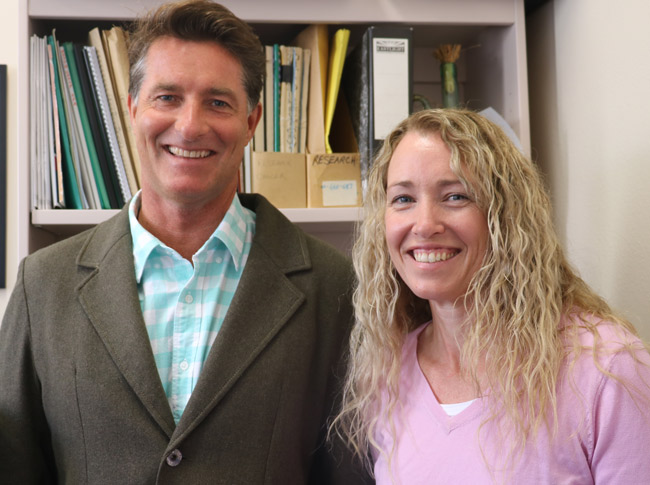
New Co-Directors of the Cancer Society Social & Behavioural Research Unit, Richard Egan and Louise Marsh.
The new Co-Directors of the Cancer Society Social & Behavioural Research Unit, Dr Richard Egan and Dr Louise Marsh, are keen to ensure they make a real difference to the wellbeing of New Zealanders through high-quality research.
Dr Marsh began in her role at the start of the year, replacing former Co-Director, Rose Richards, who has taken up a new role as Director of the Centre for Pacific Health in the Division of Health Sciences. Dr Egan officially begins on 1 April this year, when current Co-Director Professor Rob McGee retires.
Around 23,000 people are diagnosed with cancer in New Zealand annually with a further 70,000 skin cancers. Yet, 60 per cent of cancers can be prevented, Dr Egan explains.
“We are very conscious of our work needing to be translatable to make a difference to people on the ground.”
"I've experienced what it's like to have cancer and I wouldn't want anyone else or their families to have to go through that."
Dr Marsh knows first-hand how devastating a diagnosis of cancer can be. She was diagnosed with breast cancer four years ago, despite being only 39 years old at the time and with no family history of the disease.
Dr Egan says her scenario highlights the “ubiquity” of cancer.
“Most of us have been impacted by the disease and our research helps to prevent future cases and inform improvements in supportive care.”
Completely in remission now, Dr Marsh acknowledges the experience gives her work in the Department of Preventive and Social Medicine an extra impetus.
“I've experienced what it's like to have cancer and I wouldn't want anyone else or their families to have to go through that,” she explains.
Her Co-Director believes her experience is an amazing story of survival.
“We have a survivor who is a researcher, who is working to help provide the answers so we can have other survivors,” Dr Egan says.
The Cancer Society Social and Behavioural Research Unit has been funded by the Cancer Society of New Zealand for the past 27 years and, sitting within the Department of Preventive and Social Medicine, is supported by the University of Otago.
Dr Egan says the Unit has a history of outstanding leaders.
“We are literally standing on the shoulders of wonderful Co-Directors. Two of them are still here in the Unit and we want to carry on the great tradition that they have developed in terms of supporting staff and building a culture.
"We are literally standing on the shoulders of wonderful Co-Directors."
“There is something special going on with a really positive social climate in the Unit and we're really conscious of helping people be the best they can be, so they can be great researchers too.”
The new Co-Directors bring a vast array of experience to their roles. Originally a secondary school teacher, Dr Egan has a background in spirituality, health promotion and public health, beginning work in the Department of Preventive and Social Medicine as a teaching fellow in 2010. His research interests are in psycho-social-spiritual supportive cancer care, health promotion, spirituality and palliative care.
Dr Marsh's interest in public health was sparked after moving to the University of Otago from Lincoln University, where she completed a Bachelor of Commerce. She eventually completed a Postgraduate Diploma, master's and PhD in the Department of Preventive and Social Medicine. Her research focus is on helping New Zealand achieve the Government's goal of Smokefree 2025.
The role of the Unit is to provide high quality social and behavioural research to reduce the incidence, impact and inequity of cancer. Staff achieve this by independently identifying and promoting proven ways of changing values, attitudes and behaviours in society with the goal of improving public health.
The Unit currently has researchers focusing on the areas of smokefree, skin cancer primary prevention, alcohol, cancer perceptions, supportive care and workforce development.